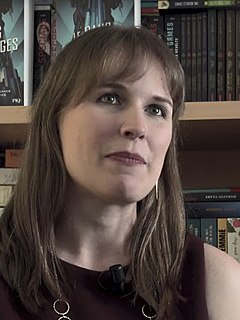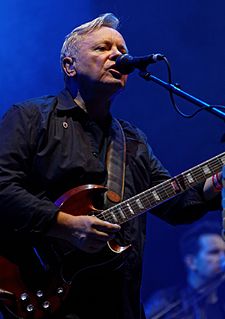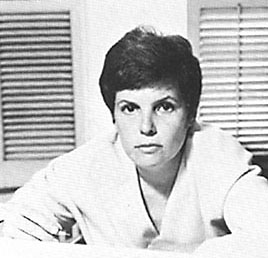A Quote by Marissa Meyer
But her grandmother had never suggested she could think the same of Scarlet. You'll be fine, she always said, after a skinned knee, after a broken arm, after her first youthfull heartbreak. You'll be fine, because you're strong, like me.
Related Quotes
I have known her longer, my smile said. True, you have been inside the circle of her arms, tasted her mouth, felt the warmth of her, and that is something I have never had. But there is a part of her that is only for me. You cannot touch it, no matter how hard you might try. And after she has left you I will still be here, making her laugh. My light shining in her. I will still be here long after she has forgotten your name.
After my mother died, I learned that she'd had a scholarship to the University of Nebraska, but - in kind of a tradition that females don't do things like that - her father prevented her from going. She always said that she wasn't allowed to go to college, but until she died, I never knew that she'd had this scholarship.
Rehv swooped down with his long arms and gathered her up against him, tucking her with vital care to his chest. Ducking his head to hers, his voice was deep and grave. "I never thought I would see you again." As he shuddered, she lifted her hands up to his torso. After holding herself back for a moment...she embraced him as fully as he did her. "You smell the same," she said rought, putting her nose right into the collar of his fine silk shirt. "Oh...God, you smell the same.
"She (Minnie Ruth Solomon) was unusual because even though I knew her family was as poor as ours, nothing she said or did seemed touched by that. Or by prejudice. Or by anything the world said or did. It was as if she had something inside her that somehow made all that not count. I fell in love with her some the first time we ever talked, and a little bit more every time after that until I thought I couldn't love her more than I did. And when I felt that way, I asked her to marry me . . . and she said she would."
She didn't care anymore... and she got no pleasure from the work she did, but she did it. Everything bored her. She found that when she didn't have a notebook it was hard for her to think. The thoughts came slowly, as though they had to squeeze through a tiny door to get to her, whereas when she wrote, they flowed out faster than she could put them down. She sat very stupidly with a blank mind until finall 'I feel different' came slowly to her mind. Yes, she thought, after a long pause. And then, after more time, 'Mean, I feel mean.
Occasionally, on screen, Barbara [Stanwyck] had a wary, watchful quality about her that I've noticed in other people who had bad childhoods; they tend to keep an eye on life because they don't think it can be trusted. After her mother was killed by a streetcar, she had been raised in Brooklyn by her sisters, and from things she said, I believe she had been abused as a child. She had lived an entirely different life than mine, that's for sure, which is one reason I found her so fascinating. I think her early life was one reason she had such authenticity as an actress, and as a person.
She had always been a reader… but now she was obsessed. Since her discovery of the book hoard downstairs from her job, she’d been caught up in one such collection of people and their doings after the next…The pleasure of this sort of life – bookish, she supposed it might be called, a reading life – had made her isolation into a rich and even subversive thing. She inhabited one consoling or horrifying persona after another…That she was childless and husbandless and poor meant less once she picked up a book. Her mistakes disappeared into it. She lived with an invented force.
My mother lived her life through movies and books - she read everything there was to read. And she read to me every night. I never went to sleep without her reading to me. And she fantasized about the book and she would talk about it, the place, and you would think that after she read the book and after she told you stories about it, that she had actually been there. I learned about story from her, and I learned the value of a great story, and the value of great characters.
The world taught women nothing skillful and then said her work was valueless. It permitted her no opinions and said she did not know how to think. It forbade her to speak in public and said the sex had no orators. It denied her the schools, and said the sex had no genius. It robbed her of every vestige of responsibility, and then called her weak. It taught her that every pleasure must come as a favor from men and when, to gain it, she decked herself in paint and fine feathers, as she had been taught to do, it called her vain.
Tessa had begun to tremble. This is what she had always wanted someone to say. What she had always, in the darkest corner of her heart, wanted Will to say. Will, the boy who loved the same books she did, the same poetry she did, who made her laugh even when she was furious. And here he was standing in front of her, telling her he loved the words of her heart, the shape of her soul. Telling her something she had never imagined anyone would ever tell her. Telling her something she would never be told again, not in this way. And not by him. And it did not matter. "It's too late", she said.
I’ve never cheated on a lover. I’m faithful, always. But the war comes before anyone’s feelings. Every time.” Wow. Battle before love. Without a doubt, he was the most unromantic male she’d ever met. Even more so than her great-grandfather, who had laughingly burned her great-grandmother to death after she’d given birth to Gwen’s grandmother.






































